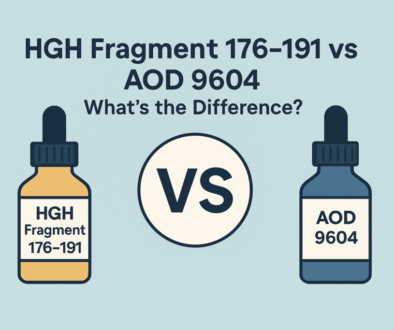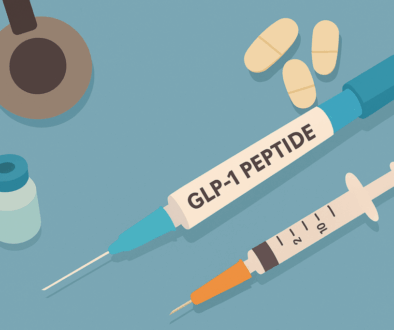10 Emerging GLP-1 Weight Loss Peptides: Retatrutide & More

GLP-1 peptides have rapidly gained mainstream popularity due to their remarkable effectiveness in promoting weight loss.
While the likes of semaglutide are now well known, many new GLP-1 therapies are currently being developed. Here’s a look at ten promising new GLP-1 peptides that are currently undergoing research and will become available in the coming years.
Quick Summary:
- New-generation GLP-1 peptides like retatrutide appear much more effective than existing therapies.
- Researchers are studying several pill-form GLP-1 drugs, which can be taken daily and have comparable effects to standard injections.
- We can expect these new GLP-1 therapies to become available in 2026 and beyond.
GLP-1 Glossary
Peptide: A short chain of amino acids that can act as a hormone or signaling molecule in the body.
GLP-1 (Glucagon-Like Peptide-1): A hormone that reduces appetite, slows digestion, and helps regulate blood sugar.
GLP-1 Peptide: A peptide drug that mimics GLP-1 by activating its receptors and promoting weight loss. Some GLP-1 peptides also activate receptors for other hormones, like the three below.
Glucagon: A hormone that increases blood sugar and promotes fat burning by releasing stored energy.
GIP (Glucose-Dependent Insulinotropic Polypeptide): A hormone that helps the body release insulin after eating and may support metabolism.
Amylin: A hormone that slows digestion, reduces appetite, and helps control blood sugar.
Join Our Newsletter — Get 15% Off
Get the latest offers, peptide research insights, and stock updates.
Table Of Contents
Oral Semaglutide
As the name suggests, oral semaglutide is a tablet version of the popular injected weight loss peptide. It’s taken once a day and appears to be about as effective as its injected counterpart.
A 2023 study found that adults taking this oral peptide lost up to 15% of their starting body weight after 68 weeks, which is pretty similar to what’s achieved with an injectable version of semaglutide.
Semaglutide is currently available in a few different injectable forms, including Ozempic for type-2 diabetes and Wegovy for obesity.
Oral Amycretin
Oral amycretin is a once-daily oral tablet that works on two hormones: GLP-1 and amylin, which is a hormone that helps you feel full after meals. Novo Nordisk, the pharmaceutical company behind amycretin, is also developing a jab version.
Data from an unpublished 2024 study suggests it could be a strong competitor to other weight loss peptides. Participants who took it in the study lost an average of 13% of their starting weight after only 3 months. The most common side effects were mild to moderate gastrointestinal issues, similar to other drugs in this category.
Oral amycretin is expected to become available within the next few years.
Retatrutide
Retatrutide is arguably the most exciting new GLP-1 peptide. As a triple agonist, it simultaneously works on three different receptors: GIP, GLP-1, and glucagon. It’s a once-weekly injection.
A 2023 randomized controlled trial (RCT for short, the gold standard of clinical research) found that obese/overweight adults taking retatrutide lost up to 24% of their initial body weight after 48 weeks, making it the most effective weight loss peptide to date.
Retatrutide is currently undergoing phase 3 clinical trials and is expected to become available in 2026 at the earliest.
CagriSema
CagriSema is a combination of two GLP-1 peptides, cagrilintide, which works on amylin receptors, and semaglutide, which is a standard GLP-1 agonist. It’s taken as a once-weekly injection.
Early findings suggest it leads to more weight loss than taking either peptide by itself. In one 2023 study of diabetics, CagriSema led to 15.6% weight loss vs. only 5.1% for semaglutide alone and 8.1% for cagrilintide alone after 32 weeks.
Similar to retatrutide, CagriSema is expected to be available in 2026 at the earliest.
Ecnoglutide
Ecnoglutide is a longer-acting GLP-1 medication. It’s injected once a week and is thought to be a better version of Saxenda (liraglutide), another weight loss peptide drug.
A 2024 RCT study in diabetics found that it led to 1.6-2.3 kg of weight loss after 20 weeks, but longer studies comparing it to other GLP-1 peptides are needed. A pill version is also being developed.
Mazdutide
Mazdutide is another weight-loss peptide that targets GLP-1 and glucagon. It’s an injectable you take once a week. A 2023 RCT study of mazdutide in overweight and obese adults found that it led to 6.7 – 10.4% weight loss after 24 weeks.
Survodutide
Survodutide is another emerging injectable GLP-1 agonist that also works through the glucagon hormone, which enhances fat-burning and energy expenditure. In a 2024 RCT study of 387 overweight or obese individuals, survodutide led to 6.2-14.9% weight loss after 46 weeks. It’s expected to launch in 2027 or 2028.
VK2735
VK2735 is a synthetic peptide that works as a dual GLP-1/GIP agonist. An unpublished clinical study of VK2735’s injectable form in 125 obese adults found that it caused up to 13.1% weight loss after only 13 weeks.
Viking Therapeutics, the company behind the peptide, is also working on an oral tablet version. Findings from an unpublished 28-day study of oral VK2735 report up to 5.3% weight loss.
MariTide
MariTide is another injectable medication with peptide-like effects. It’s different from most other weight loss peptides because it targets GLP-1 but blocks rather than activates GIP and only needs to be injected once a month.
The latest phase 2 clinical trial of maritide reported that overweight or obese individuals lost up to 20% of body weight after 52 weeks.
Orforglipron
Orforglipron is a non-peptide GLP-1 medication taken as a daily capsule. A 2023 RCT study of 272 adults with obesity reported 9.4 to 14.7% weight loss after 36 weeks. Side effects were similar to injectable GLP-1 peptides.
The most exciting part about orforglipron is that it’s reportedly cheaper and easier to mass produce than existing GLP-1 drugs. Orforglipron is expected to become available in 2026.
Bonus: SLU-PP-332
While GLP-1 peptides continue to dominate the weight loss space, researchers are also exploring new types of compounds that target obesity from a different angle.
One such new peptide-like compound is SLU-PP-332, an experimental drug that acts as an exercise mimetic—a substance that mimics the effects of aerobic exercise (like running) without requiring physical activity.
Instead of acting on GLP-1 receptors, SLU-PP-332 activates a group of proteins that play a key role in energy metabolism and mitochondrial function. Importantly, SLU-PP-332 showed no serious side effects in mice—even at high doses—and did not affect food intake, muscle health, or liver enzyme levels. However, it hasn’t been tested in human studies yet.
-
- Knop, Filip K., et al. “Oral semaglutide 50 mg taken once per day in adults with overweight or obesity (OASIS 1): a randomised, double-blind, placebo-controlled, phase 3 trial.” The Lancet 402.10403 (2023): 705-719.
- Halsey, Grace. “Novo Nordisk Shares Early Findings for Novel Oral Antiobesity Agent.” Patient Care (Online) (2024).
- Jastreboff, Ania M., et al. “Triple–hormone-receptor agonist retatrutide for obesity—a phase 2 trial.” New England Journal of Medicine 389.6 (2023): 514-526.
- Frias, Juan P., et al. “Efficacy and safety of co-administered once-weekly cagrilintide 2· 4 mg with once-weekly semaglutide 2· 4 mg in type 2 diabetes: a multicentre, randomised, double-blind, active-controlled, phase 2 trial.” The Lancet 402.10403 (2023): 720-730.
- Ji, Linong, et al. “A phase 2 randomised controlled trial of mazdutide in Chinese overweight adults or adults with obesity.” Nature Communications 14.1 (2023): 8289.
- Zhu, Dalong, et al. “Efficacy and safety of GLP-1 analog ecnoglutide in adults with type 2 diabetes: a randomized, double-blind, placebo-controlled phase 2 trial.” Nature Communications 15.1 (2024): 8408.
- le Roux, Carel W., et al. “Glucagon and GLP-1 receptor dual agonist survodutide for obesity: a randomised, double-blind, placebo-controlled, dose-finding phase 2 trial.” The Lancet Diabetes & Endocrinology 12.3 (2024): 162-173.
- https://vikingtherapeutics.com/pipeline/metabolic-disease-program/vk2735/
- Jennings, Sydney. “Amgen Reports Promising Phase 2 Data on MariTide for Obesity, Type 2 Diabetes Management.” Patient Care (Online) (2024).
- Wharton, Sean, et al. “Daily oral GLP-1 receptor agonist orforglipron for adults with obesity.” New England Journal of Medicine 389.10 (2023): 877-888.



